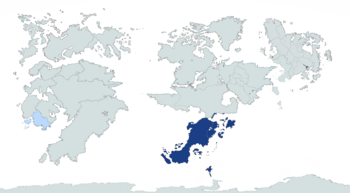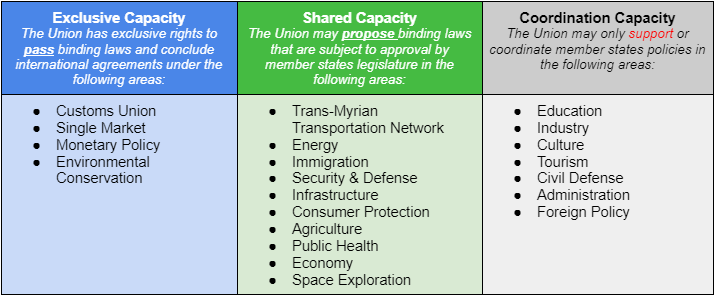Myrian Union: Difference between revisions
mNo edit summary |
No edit summary |
||
| Line 95: | Line 95: | ||
* [[Tribunal of the Myrian Union]]: This is the equivalent of the union's {{wp|judiciary}} branch, whose judges are nominated by all member states of the union on an equal basis. It oversees various court cases but only in matters related to Myrian Union Law. The Tribunal is further divided into two sub-branches: the [[Constitutional Court]] which oversees matters related to Myrian Union Law, a term that collectively refers to all the treaties & articles enshrined in the Charter of the Myrian Union. National governments are the general users of the Constitutional Court. The second branch of the Tribunal is the [[General Tribunal]] where national governments, companies/organizations and private citizens. | * [[Tribunal of the Myrian Union]]: This is the equivalent of the union's {{wp|judiciary}} branch, whose judges are nominated by all member states of the union on an equal basis. It oversees various court cases but only in matters related to Myrian Union Law. The Tribunal is further divided into two sub-branches: the [[Constitutional Court]] which oversees matters related to Myrian Union Law, a term that collectively refers to all the treaties & articles enshrined in the Charter of the Myrian Union. National governments are the general users of the Constitutional Court. The second branch of the Tribunal is the [[General Tribunal]] where national governments, companies/organizations and private citizens. | ||
==== Administration ==== | ==== Administration ==== | ||
* [[Reserve Bank of Myria]]: The RBM serves as the MU's {{wp|central bank}} it makes & enforces the {{wp|monetary policy}} for the Morazone and the Myrian Union, sole right to authorize the issuance & printing of Mora banknotes and determines {{wp|interest rate}} of the Myrian Union. Its stocks is owned by the two central banks of MU members as shareholders of the RBM. The RBM was formed in 2012 to maintain {{wp|price stability}} of the Mora when it comes into full force in 2016. All central banks of the MU must follow the policies & monetary policy established by the RBM. | |||
* [[Audit Board of Myria]]: The ABM is professional and independent audit agency of the MU that is responsible for the accountability of all financial activities undertaken by the various committees & organs of the Myrian Union. It ensures that the various spending made by the MU as a whole was done legally and responsibly. It conducts annual audits of the MUs budget and may conduct an audit on specific areas of the MU when requested to do so by a member state. While the ABM must be consulted by the Myrian Secretariat for any legislation that has financial implications, it may only provide a non-binding advisories. | |||
=== Capacities === | === Capacities === | ||
Capacities are specific areas of governance and sovereignty has been voluntarily transferred from member states to the Myrian Union. This act is known as bestowment. By bestowing the MU with certain Capacities its member states voluntarily renounces any capability to initiate or pass legislation related to said Capacities. There are three types of Capacities: Exclusive, Shared & Coordinating. | |||
[[File:Capacities of the Myrian Union.png|3000px|frame|center]] | |||
=== Security & Defense === | === Security & Defense === | ||
=== Foreign Relations === | === Foreign Relations === | ||
Revision as of 17:12, 18 February 2022
This article is incomplete because it is pending further input from participants, or it is a work-in-progress by one author. Please comment on this article's talk page to share your input, comments and questions. Note: To contribute to this article, you may need to seek help from the author(s) of this page. |
|
Flag | |
 Member states of the Myrian Union highlighted in navy blue Partners of the Myrian Free Trade Area highlighted in light blue | |
| Committees of the Union | Rongyu
Haibin
|
| Working languages | Myrian Mizuhese |
| Type | Supranational Union |
| Membership | Full Members Free Trade Area Members |
| Leaders | |
• Secretary-General | Húxiān Minamoto |
• President of the Myrian Quorum | TBD |
• Chairman of the Myrian Conclave | TBD |
• Speaker of the Myrian Congress | TBD |
• Chief Justice of the Myrian Tribunal | TBD |
• Governor of the Reserve Bank of Myria | TBD |
• Chair of the Audit Board of Myria | TBD |
| Establishment | |
• Myrian Free Trade Area | 10 April 1956 |
• Myrian Fisheries Treaty | 31 October 1961 |
• Association of Myrian Nations | 22 August 1970 |
• Myrian Customs Union | 9 of July 1989 |
• Charter of the Myrian Union | 1 January 2012 |
| Area | |
• Total | 6,621,704 km2 (2,556,654 sq mi) |
| Population | |
• 2015 estimate | 245,132,113 |
• Density | 37.02/km2 (95.9/sq mi) |
| GDP (PPP) | 2015 estimate |
• Total | |
• Per capita | |
| GDP (nominal) | 2015 estimate |
• Total | |
• Per capita | |
| Currency | Mora (M) |
The Myrian Union (MU) (Myrian: 密里安联盟 Mìlǐānliánméng; Mizuhese: 巳廉連合 Miren-rengō) is a political and economic union of all nations in the Myrian continent, its primary objectives are the economic integration & cooperation, providing regional security & stability as well as a military alliance amongst member states. Its two member states are the Commonwealth of Aldia and the Fusou Empire, has a total area of 6,621,704 km2 (2,556,654 sq mi) which covers the entire continent of Myria and a combined population of more than 245 million citizens. Some of the most notable policies of the MU is the free movement of goods, servies, capital & people within the MU Common Market, establishment of monetary union (Morazone) in 2012 which came into full force by 2016 where both Aldia & Fusou adopted the Mora as their national currencies, and the ability for the MU to propose and pass laws in certain areas without the need for approval from member states. The latter is only made possible as all member states have agreed to cede some of their sovereignty to the MU, these areas include: the single market, the Morazone, the customs union and the MU's environmental policies. This arrangement has allowed the Union to act unilaterally but only within the areas specifically where member states have given it permission to do so. Internal border checks and passport controls have been abolished and citizens from member states are free to travel, live, and work freely without the need to apply for a visa.
As one of the newest supranational unions, the MU has sought to invite other nations to join whether as full member states, observers or partners in one of its three economic programs: the Myrian Free Trade Area, the Myrian Customs Union or the Myrian Common Market. The MU can trace its origins to the establishment of the Myrian Free Trade Area in 1956. This was when both Aldia & Fusou agreed to promote economic growth & cooperation between themselves and was quickly followed by the Myrian Fisheries Treaty of 1961. An informal intergovernmental forum known as the Association of Myrian Nations was formed in 1970 where the heads of governments & ministers from both Aldia & Fusou would meet on an annual basis to discuss various matters ranging from social issues to economic ventures. The AMN is often considered as the precursor of the MU itself as it was through the 1989 AMN Summit was the Myrian Customs Union was formed. As the decades went on and both Aldia & Fusou became more economically & politically integrated, discussions were held at the highest level of government whether or not to make a more structured organization. Negotiations began in 2008 and finally concluded in 2011. Both countries then held referendums for its citizens, allowing its citizens to choose which path their nations will take. Be it maintain the status quo or to establish the MU. By a majority, the populations of both countries approved for the establishment of the Myrian Union and thus on the 1st of January 2012, the MU was formed.
History
Beginnings
Association of Myrian Nations
Catalyst: the Myrian Customs Union
Formation of the Myrian Union
Member States
Government & Politics
The Myrian Union was established through a series of treaties that has been ratified throughout the 20th and 21st centuries. The 2012 Charter of the Myrian Union enshrines these treaties into a single cohesive document, forming the foundations of the Union. The powers of the union are granted through the principle of bestowment, and according to this principle member states of the Myrian Union voluntarily cede certain aspects of their sovereignty to the union. As a result, the union is given exclusive rights to act on behalf of all member states in areas where it has been given bestowment by its member states. On the other hand, the union does not have the right to intervene in matters that are outside of the rights that were bestowed upon it. In all treaties, member states of the union are referred to as the sovereign holders of treaties, reflecting the enshrined status of each member states sovereignty.
Committees
The Myrian Union has seven principal decision making bodies known as Committees, with five responsible for the governance of the union and two for the direct administration of union laws. These Committees are: the Myrian Secretariat, the Myrian Quorum, the Conclave of Ministers, the Myrian Congress, Tribunal of the Myrian Union, Reserve Bank of Myria and the Audit Board of Myria. Executive powers are exercised by the Myrian Secretariat as it is the only body who posses the powers of legislative initiative allowing it to propose laws whereas both the Conclave of the Myrian Union & the Myrian Congress share powers only to approve/reject legislation and recommend amendments.
Governance
- Myrian Secretariat: The Secretariat serves as the union's executive arm and holds legislative initiative in the union government. It is led by the Secretary-General, whose position is nominated by the Conclave and must be approved by Congress. The Secretary-General may then appoint a collegiate body of Under-Secretaries who help assist the Secretary-General in performing day-to-day governance of the union, each responsible for a specific or a group of issues such as the environment, social policies, coordination between member states and many others. These Under-Secretaries must also be approved by Congress.
- Myrian Quorum: The Quorum is the union's advisory arm, is responsible for providing guidance and advise to the various committees of the union and its members are comprised of the heads of government from every member state of the union. The Quorum meets once every year, continuing the tradition of the annual summits of the Association of Myrian Nations. Currently it is comprised of two members from both Aldia and Fusou. The Quorum is led by a President of the Quorum, a rotating presidency which ensures each member state is given a fair chance to hold the Presidency of the Quorum once every two years.
- Conclave of Ministers: The Conclave is one of the two legislative bodies of the union, however it does not hold the power of legislative initiative. It may only approve, reject or propose amendments of legislation passed from the Myrian Congress and in this scope it acts as the equivalent of an upper house of the union's legislative structure. As its name suggests the Conclave is comprised of the Ministers from each member state and come together when legislation from Congress has been approved. While Congress ensures that the voice of the union citizens are heard, the Conclave ensures that the government from each member state are given a voice as well. The Conclave also holds the powers to impeach the Secretariat and, in the event a member state of the union is attacked, to approve declarations of war when requested by the Secretariat.
- Myrian Congress: Congress is thhe second legislative body of the union, like the Conclave it only holds the power to approve, reject or propose amendments for bills proposed by the Secretariat and serves as the union's equivalent of a lower house. Its members are referred to as Members of the Myrian Parlimanet (MMP) who are directly elected by citizens of every member state during every Myrian Election cycles. Congress also has the power to approve or reject the nominated Secretary-General and their nominations of Under-Secretaries.
- Tribunal of the Myrian Union: This is the equivalent of the union's judiciary branch, whose judges are nominated by all member states of the union on an equal basis. It oversees various court cases but only in matters related to Myrian Union Law. The Tribunal is further divided into two sub-branches: the Constitutional Court which oversees matters related to Myrian Union Law, a term that collectively refers to all the treaties & articles enshrined in the Charter of the Myrian Union. National governments are the general users of the Constitutional Court. The second branch of the Tribunal is the General Tribunal where national governments, companies/organizations and private citizens.
Administration
- Reserve Bank of Myria: The RBM serves as the MU's central bank it makes & enforces the monetary policy for the Morazone and the Myrian Union, sole right to authorize the issuance & printing of Mora banknotes and determines interest rate of the Myrian Union. Its stocks is owned by the two central banks of MU members as shareholders of the RBM. The RBM was formed in 2012 to maintain price stability of the Mora when it comes into full force in 2016. All central banks of the MU must follow the policies & monetary policy established by the RBM.
- Audit Board of Myria: The ABM is professional and independent audit agency of the MU that is responsible for the accountability of all financial activities undertaken by the various committees & organs of the Myrian Union. It ensures that the various spending made by the MU as a whole was done legally and responsibly. It conducts annual audits of the MUs budget and may conduct an audit on specific areas of the MU when requested to do so by a member state. While the ABM must be consulted by the Myrian Secretariat for any legislation that has financial implications, it may only provide a non-binding advisories.
Capacities
Capacities are specific areas of governance and sovereignty has been voluntarily transferred from member states to the Myrian Union. This act is known as bestowment. By bestowing the MU with certain Capacities its member states voluntarily renounces any capability to initiate or pass legislation related to said Capacities. There are three types of Capacities: Exclusive, Shared & Coordinating.

